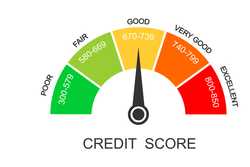How to Get a Personal Loan Without a Credit Check

Our evaluations and opinions are not influenced by our advertising relationships, but we may earn a commission from our partners’ links. This content is created by TIME Stamped, under TIME’s direction and produced in accordance with TIME’s editorial guidelines and overseen by TIME’s editorial staff. Learn more about it.
Personal loans can be used to consolidate debt, fund large expenses, or cover emergencies when cash is tight. No-credit-check loans are a category of personal loans that allow you to apply and be approved without a lender looking at your credit reports or scores.
No-credit-check loans can allow for easier access to funds, though there are some potential downsides to consider, especially the risk of significantly higher borrowing costs. People who consider this borrowing option often have a poor credit history or no history at all. Or they may be the target of predatory marketers and unaware that they actually could qualify for a loan at a more favorable rate.
Here's a closer look at how no-credit-check loans work and where they are offered.
A no-credit-check loan is just what it sounds like: a personal loan that doesn't require a hard credit check for approval. Ordinarily, when you apply for a loan or line of credit, the lender will pull your credit reports and check your credit scores to gauge how much of a risk you present as a borrower. Higher credit scores usually indicate lower risk, i.e., you're likely to pay back what you borrow.
No-credit-check loans skip the credit check and use other criteria to approve borrowers. For example, a lender might look at your income or bank account balance instead. Or it may ask for collateral and grant you a loan based on its value.
Once approved, you'd pay the loan back just as you would any other type of loan. The lender sets the repayment schedule and determines how much you'll pay in interest and fees to borrow. Note that some of these loans charge exorbitant interest rates that reach deep into predatory lending territory.
Below are some relatively reasonable possibilities for getting a no-credit-check loan. Let’s look at how they compare.
An installment loan allows you to borrow money and pay it back in installments. As you make payments, your loan balance goes down until it reaches zero. You can find installment loans with no credit check offered by online lenders. In terms of what you'll need to qualify, the list includes:
Repayment terms for no-credit-check installment loans can vary by lender, though they're typically short-term loans. Lenders can also set minimum and maximum thresholds for borrowing. Again, be very careful about the rates before you sign up for one of these.
Buy now, pay later (BNPL) financing allows you to make a purchase online and pay for it in a series of installments. Typically, you make a deposit payment up front, then you pay off the rest of your purchase in a series of three to six additional weekly or biweekly payments.
While some BNPL platforms consider credit scores, there are others that can approve you with no credit check. This type of financing option is usually best suited for smaller purchases, where you may only need to borrow a few hundred dollars.
Cash advance apps can offer you an advance on your paycheck without requiring a credit check. You repay the loan from your next paycheck. Using a cash advance app generally requires that you get paid via direct deposit.
Similar to BNPL financing, cash advance apps are typically suited for borrowing small amounts of money. Depending on the app, you might be limited to getting a set dollar amount or borrowing a fixed percentage of your paycheck.
Not sure where to find one of these loans? We researched various lenders to find reputable financing options for borrowers who may have less-than-perfect or nonexistent credit.
| Lender | Loan Type | Amount | APR | Fees |
|---|---|---|---|---|
Oportun | Installment | $300 to $10,000 | 35.99% | Origination fee |
OppLoans | Installment | $500 to $4,000 | 59% to 160% | None |
Integra Credit | Installment | $2,600 to $3,000 | 149% | Late fee |
Possible Finance | Installment | Up to $800 | 0% | None |
Affirm Pay in 4 | BNPL | Up to $3,000 | 0% | None |
Afterpay Pay in 4 | BNPL | Up to $600 for new customers | 0% | None, when you pay on time |
Empower | Cash advance | Up to $250 | 0% | None |
EarnIn | Cash advance | Up to $750 per pay period | 0% | None |
MoneyLion | Cash advance | Up to $500 | 0% | None |
No-credit-check loans can offer convenient access to funding, but can sometimes be a costly way to borrow that entails considerable risk. Here's a breakdown of the pros and cons of getting a loan without a credit check.
| Pros | Cons |
|---|---|
No-credit-check loans allow you to get approved without requiring a hard pull of your credit reports or scores. | Repaying a no-credit-check loan isn't guaranteed to help you build credit, as lenders may not report to the credit bureaus. |
It's possible to get cash quickly, with some loans being funded the same day or within one to two business days. | Loan limits may be lower than personal loans that require a credit check, which may necessitate getting more than one loan. |
While some no-credit-check loans require collateral, it's possible to find unsecured borrowing options. | Defaulting on a secured no-credit-check loan can mean losing your collateral. |
There's one more huge con to consider. The cost of getting a no-credit-check loan can be substantially higher than other loans that require a credit check. One reason is that the lender is assuming more risk and offsets it by charging borrowers higher interest rates and more fees.
You may already be aware that there are other ways to get a quick no-credit-check loan that we haven’t discussed yet. Three of the most common borrowing options are:
How do these loans work? Let's use a car title loan as an example.
To get a car title loan, you typically just need one main thing: a title to a car that you own. The title (and the vehicle connected to it) can serve as collateral for a loan. A title lender would estimate how much your vehicle is worth, then offer you a percentage of its value as a loan.
Say your vehicle is valued at $5,000. The lender might offer you 25% of that, which is $1,250. If you accept, you'll get cash in hand while the lender gets to hold onto your car title. Assuming that you pay the loan off as scheduled, you'll get your title back. If you don't, however, the lender could keep your title and lay claim to your vehicle to satisfy the loan.
Pawn loans work much the same way. You offer an item of value as collateral, then get a short-term loan in exchange. If you pay off the loan, you get your collateral back. A pawn shop may also give you the option to sell your item outright for cash.
Payday loans are a little different. They provide you with an advance on your next paycheck. When you get paid again, you pay off the loan. It sounds good in theory, but paycheck loans can potentially create an expensive cycle of debt, as the effective annual percentage rate (APR) can easily reach 390% or higher.
When looking for a no-credit-check loan, it's important to do your research. While there are different ways to borrow without a credit check, lenders aren't all the same.
As you compare loans with no credit check, consider the following:
Lenders may forego a credit check, but there might be other minimum requirements you'll have to meet to get a loan. It's helpful to know up front if you'll need a certain amount of income or a bank account to qualify. It’s also worth checking at least one lender to see if your credit score qualifies you for a personal loan with a lower interest rate than a no-credit-check loan is likely to offer.
Unsecured loans without a credit check allow you to borrow without putting collateral on the line. If you're considering a secured loan, it's important to understand what might happen to your collateral if you're unable to pay it back.
No-credit-check loans will likely be more expensive than other loan options. It's important to check the interest rate and APR, so you know exactly what you'll pay. Then consider if it’s a fair-enough rate. For example, the National Consumer Law Center reports that 45 states and the District of Columbia cap the rate on a $500 six-month installment loan at 39.5%. Anything higher is considered exploitative.
A no-credit-check lender may charge origination fees, late fees, and/or prepayment penalties, all of which can increase your cost of borrowing. Reviewing the fee schedule beforehand can help you avoid any surprises.
It's also important to keep funding speed in mind if you need money in an emergency situation. Being able to get loan funds the same day or the next business day could be a good reason to choose one lender over another.
No-credit-check loans can be convenient, but they're not always ideal. Not only can they be expensive; they also may not do much to help you build a good credit history. Payment history carries the most weight in credit scoring, according to myFICO. But if loan payments don't show up on your credit reports, they aren't doing your score any good. Of course, you don't want to pay a no-credit-check loan late, as that could trigger a late fee.
You might consider a no-credit-check loan if you've weighed all other financing options and come up empty. Even then, it's important to recognize the risks and fully evaluate the cost, so you know what you're signing up for when you borrow.
If you're getting a no-credit-check loan, you might be able to offset some of the negatives by paying it back as quickly as possible. This could save you money on interest. Just be sure to check and see if the lender charges a prepayment penalty for doing so.
When you need money, it's a good idea to explore all the options for borrowing. You might consider any of the following in place of a no-credit-check loan.
If you have something of value to offer as collateral, you might consider getting a secured loan that isn’t a car title or pawn loan. There may be a credit check involved, but if your collateral is sufficient, it could help you to get approved.
Keep in mind that your loan amount may be determined by the value of your collateral. Still, paying back a secured loan can help you build a positive credit history if you're paying on time. You can use a free service such as Experian to monitor your credit scores from month to month. Using Experian Boost, which is also free, may help to raise your FICO score.
Get a cosigner
A cosigner is someone who applies for a loan with you and agrees to be held equally responsible for the debt. Getting a cosigned loan could help you borrow a larger amount or qualify for a lower interest rate if your cosigner has good credit.
There is a catch, however. If you default on the loan, your credit score—and your cosigner's—can suffer. This could hurt your relationship, so think twice before moving forward.
Credit-builder loans are designed specifically to help you build credit. They typically don't put money in your hands; instead, the proceeds from the loan go into an interest-bearing account.
You make payments to the lender, which are reported to the credit bureaus. Once the loan is paid off, the funds held in the interest-bearing account are turned over to you.
If you have a good relationship with friends or family members, you might turn to them when you need financial help. They may be willing to make a loan to you, which would not require a credit check.
This type of loan can be risky, because money can easily strain relationships. If you're going this route, you might consider drawing up a legally binding agreement, so that whoever is lending you the money has some reassurance that they'll be paid back.
In lieu of using a cash advance app or payday loan, you might ask your employer for an advance from your pay. This can amount to an interest-free loan without a credit check.
The downside is that your employer may ask why you need a paycheck advance, which could lead to an uncomfortable conversation. Additionally, the money will have to be paid back on your next payday, which could throw off your budget for the month.
In certain types of situations, you can borrow against your 401(k), if you have funds saved there. There are specific rules about who can take this type of loan, but it is worth investigating in a true emergency. You will have to pay interest but that money goes back to you.
If you're trying to borrow money to pay bills, you might try asking the biller if they'd be willing to work out a payment arrangement. For example, if you're behind on your electric bill, the utility company may agree to spread your balance out in installments.
You might be charged a fee or interest, but this type of arrangement may be preferable to getting a no-credit-check loan.
No-credit-check loans can fill the gap when you're short of cash, but they may come with a high price. Taking time to fully understand how they work and what a no-credit-check loan might cost can help you decide if it's a borrowing option worth exploring.
The minimum credit score required for a personal loan can depend on the lender. For example, it may be possible to get a bad credit loan with a score as low as 580, while other lenders might look for a score of 660 or higher. As a general rule, a higher credit score can make it easier to get approved for loans and qualify for the lowest interest rates.
There are a number of apps that allow you to get an instant cash advance, but they typically require you to have a steady paycheck in order to qualify. The Dave app is an exception, as freelancers and independent contractors, who have irregular income, can also get short-term loans.
What is buy now, pay later (BPNL)?
With BPNL financing, you pay for a purchase in a series of set installments, allowing you to buy an item with a down payment that is less than the full price. The installments for the remainder are usually either three paid weekly or six paid biweekly.
The information presented here is created by TIME Stamped and overseen by TIME editorial staff. To learn more, see our About Us page.




